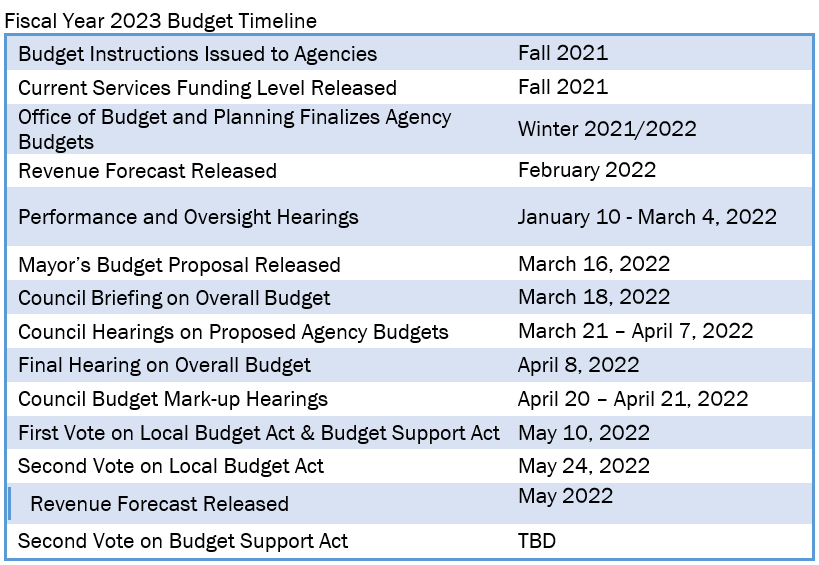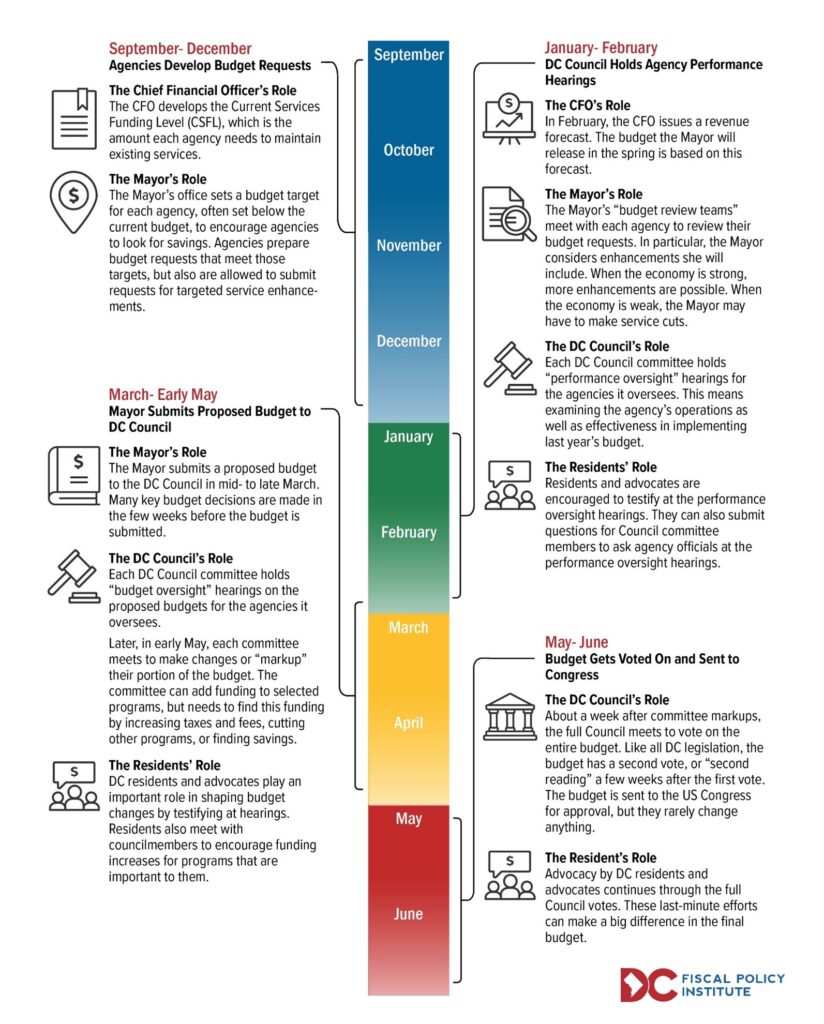Each passing budget is an opportunity to put the District on a path toward economic inclusion and a racially just future. The Council-approved FY 2023 budget funds the large majority of the DC Fiscal Policy Institute’s (DCFPI) budget requests, at least in part, which focus on ensuring that Black and brown communities and residents currently struggling with low incomes have their basic needs met, find safety and security, are valued and compensated fairly, and have what they need to live to their fullest.
However, in spite of the substantial investments in racial and economic equity, lawmakers missed opportunities to go further in addressing structural inequities and transparency issues in housing and education.
Read about what’s in the fiscal year (FY) 2023 budget.
Follow the budget process: read what was in the Mayor’s budget and what was in the FY2023 budget after the DC Council’s first vote.
Analysis of Key Issue Areas
Every service DC provides, such as trash collection, public education, and community centers, appears in the budget every year. The budget is the central tool for addressing challenges like widening racial inequities in access to affordable housing, quality health care, and educational opportunities. See below for in-depth analysis on FY 2023 budget investments in key issue areas:
Police Budget Remains Flat Despite Big Investments in Officer Recruitment and Retention
Testimony at Council Hearings on the FY 2023 Budget
DCFPI staff testified at DC Council hearings in March and April to offer recommendations on FY 2023 budget investments.
- Testimony at the Budget Oversight Hearing for the Department of Behavioral Health on the need for additional investments in the School-Based Behavioral Health program
- Testimony at the Budget Oversight Hearing for Events DC, Finance Duties, and the Office of Chief Financial Officer on ensuring the District’s recovery is inclusive of undocumented and otherwise excluded workers and equitable and sensible tax policy
- Testimony at the Budget Oversight Hearing for the Office of the State Superintendent on compensation for early childhood educators
- Testimony at the Budget Oversight Hearing for the DC Department of Health Care Finance on the need for services for residents with low incomes who have traumatic brain injuries
- Testimony at the Budget Oversight Roundtable for the Deputy Mayor for Health and Human Services on ending encampment evictions and no camping zones
- Testimony at the Budget Oversight Hearing for DC Public Schools on stabilizing school budgets for the long term
- Testimony at the Budget Oversight Hearing for the Department of Housing and Community Development on transparency and oversight
- Testimony at the Budget Oversight Hearing on the District of Columbia Housing Authority on allowing self-identification of identity
- Testimony at the Budget Oversight Roundtable on the Department of General Services on building two standalone public restrooms
- Testimony at the Committee of the Whole Budget Oversight Hearing on investments to end homelessness and affordable housing
- Testimony at the Committee of the Whole Budget Oversight Hearing on ensuring the budget is inclusive of undocumented and otherwise excluded workers
- Testimony at the Committee of the Whole Budget Oversight Hearing on investing in the School-Based Behavioral Health program.
Fiscal Year 2023 Budget Timeline
DC’s fiscal year begins October 1 and ends September 30. In the spring, the Mayor presents a budget to the Council, which then reviews, changes, and approves it before it is sent back to the Mayor to sign into law and submitted to the US Congress, which can choose to modify or reject it.

Further Resources
- DCFPI’s Priorities for the Revised FY 2022 Budget and FY 2023 Budget
- Principles for Sustaining an Equitable Recovery
- A Resident’s Guide to the DC Budget
- Revenue: Where DC Gets Its Money
- Guide to School Funding
- Visualizing the DC Police Budget
- Fiscal Year 2022 Budget Resources
- How to Testify Effectively before the DC Council
Become a Budget Advocate
The DC budget is the is the cornerstone of the public services and resources residents, businesses, and neighborhoods need to thrive and the central tool for addressing racial inequities in access to affordable housing, health care, and a quality education. To learn more about the budget, including the annual process for creating the budget and how to read budget documents, check out our Resident’s Guide to the Budget.
The fight for equity and justice can’t happen without you. Sign up to DCFPI’s email list or follow us on Twitter, Facebook, and Instagram so we can send you regular updates on our efforts and ways you can get involved. You can also learn more about the Just Recovery DC campaign on Twitter.

